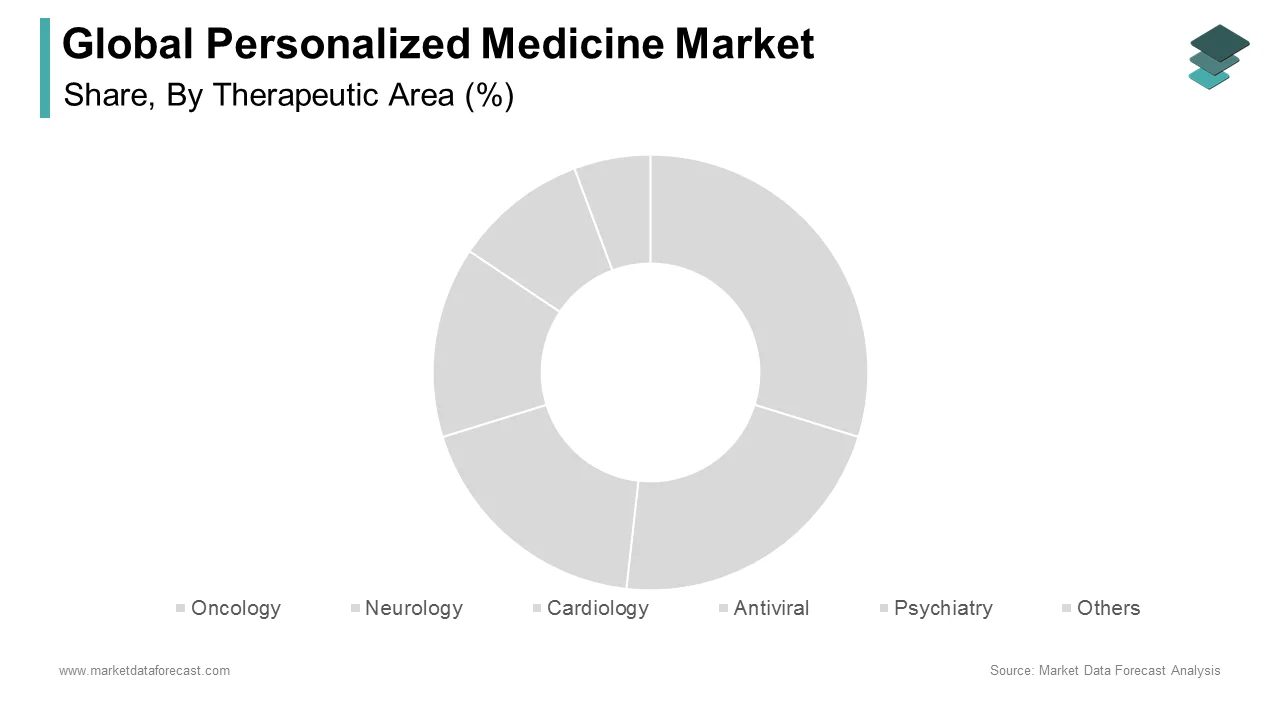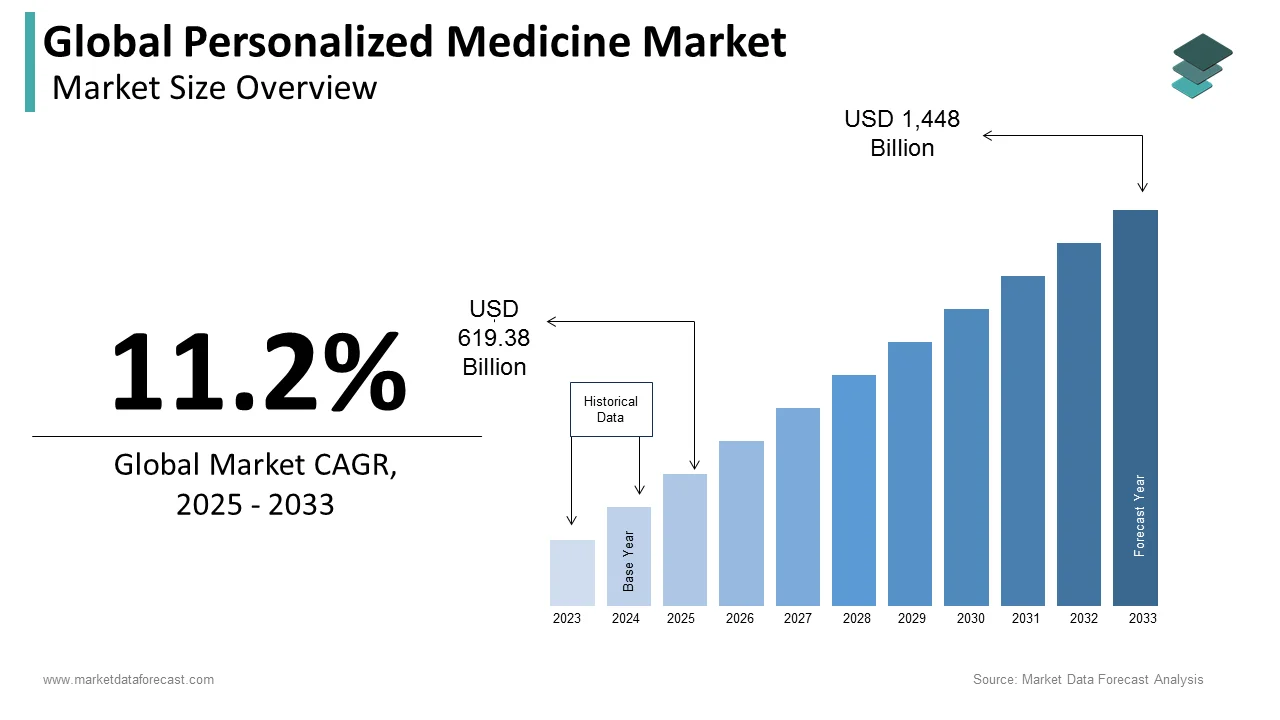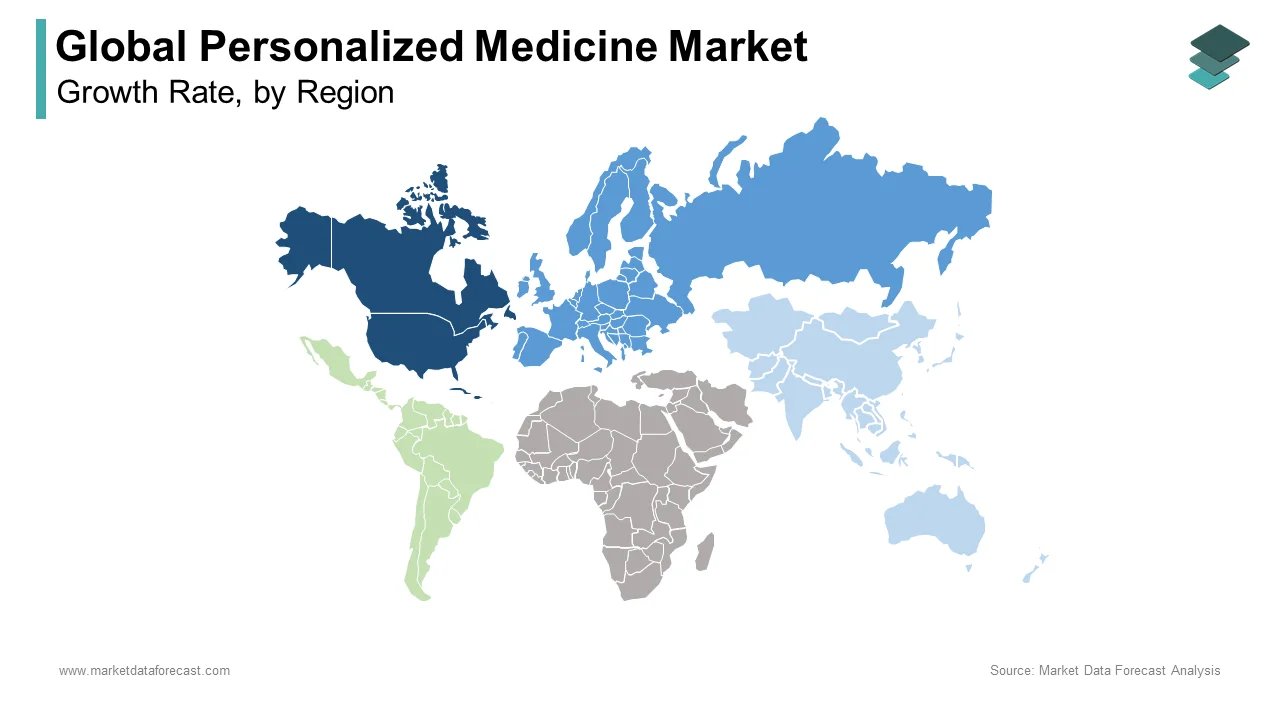Global Personalized Medicine Market Size, Share, Trends & Growth Forecast Report By Therapeutic Area (Oncology, Neurology, Cardiology, Antiviral, Psychiatry and Others), Application (Companion Diagnostics, Biomarker identification, Health Informatics and Clinical Research), End-user and Region (North America, Europe, Asia-Pacific, Latin America, Middle East and Africa), Industry Analysis From 2025 To 2033.
Global Personalized Medicine Market Size
The global personalized medicine market size was worth USD 557 billion in 2024. The global market is further forecasted to grow at 11.2% CAGR between 2025 to 2033 and be worth USD 1,448 billion by 2033 from USD 619.38 billion in 2025.
Current Scenario of the Global Personalized Medicine Market
The demand for personalized medicine is growing rapidly worldwide. Personalized medicines understand an individual’s genes or proteins and then develop an approach to treat diseases. With personalized medicine, researchers can quickly note the patient's molecular and clinical profiles. According to the GLOBAL survey in 2018, the number of cancer cases crossed 18.1 million worldwide. The same treatment procedures for the same disease may not work effectively for different people. Personalized medicine will reduce the wastage of time during trial-and-error methods for classical treatments as it entirely focuses on every individual's special characteristic. According to the Federal Drug Administration (FDA), personalized medicine mainly focuses on distinguishing patients who are most likely to get beneficial effects and the patients who incur side effects without gaining benefit. Therefore, personalized medicine plays a vital role in cancer treatment procedures. Unfortunately, according to the World Health Organization (WHO), around 1 in 6 are losing their lives due to cancer globally. Also, in 2018, there were approximately 9.6 million deaths due to cancer worldwide.
MARKET DRIVERS
The growing cancer patient population and increasing need to develop innovative treatment procedures for cancer are propelling the global personalized medicine market growth.
The cancer population is growing rapidly almost in all countries. As per the statistics published by the American Cancer Society, in 2024, more than 1.9 million new cancer cases are expected to be recorded in the United States. As mentioned in the National Library of Medicine, an estimated 1,461,427 cancer cases were recorded in India in 2022. An estimated 1 in every 9 people is likely to be diagnosed with cancer in India. Owing to the growing prevalence of cancer worldwide, the demand for new treatment procedures with technological developments is increasing. In recent years, healthcare providers and researchers have used personalized medicine to develop targeted and effective therapies to treat chronic diseases, including cancer, and this trend is expected to accelerate in the coming years and result in the growth of the personalized medicine market. Considering the growing burden of cancer, many governments have come forward in recent years to invest in developing treatment procedures for cancer, which has favored market growth.
The rising awareness of the potential benefits of personalized medicine in gene therapy is fuelling the growth rate of the global market.
The adoption of gene therapy has been growing rapidly worldwide. Gene therapy has been used to treat diseases such as cancer, inherited eye disorders, and rare genetic conditions using genetic material. Gene therapy has proven to be effective and gives lesser side effects compared to traditional treatments. In addition, increasing research and developmental activities around the development of personalized therapies are increasing awareness among people regarding the available treatment procedures for life-threatening diseases contributing to the growth of the personalized medicine market. The growing adoption of sequencing technologies such as Next-generation sequencing (NGS) in genomics is boosting the growth rate of the personalized medicine market. NGS delivers accurate data on the patient's genetics, which helps the researchers develop personalized medicine. Growing advancements in personalized diagnostics and increasing focus on companion diagnostics support the market growth.
Furthermore, factors such as growing healthcare expenditure, increasing demand for cost-effective treatments, rising adoption of electronic health records (EHRs), growing support and funding by various governments in favor of personalized medicine, rising awareness among people about the benefits of personalized medicine in the developed and developing countries, growing usage of technological advancements such as AI and ML in personalized medicine and the growing aging population contribute to the market growth.
MARKET RESTRAINTS
Limited reimbursement policies for personalized medicine hamper the growth of the worldwide market.
Poor awareness of the potential benefits of personalized medicine in some countries is impeding global market growth. In addition, strict rules and regulations by government bodies to approve innovative products and growing competition between the market players impede the market’s growth rate. Furthermore, the high costs associated with developing personalized medicine and difficulties in understanding the complex nature of drugs further inhibit the market’s growth rate.
Impact of COVID-19 on the Global Personalized Medicine Market
The sudden outbreak of COVID-19 has affected several markets worldwide. Patients already suffering from chronic diseases such as cancer, CVDs, diabetes and others have an increased risk of life when infected with the coronavirus. Unlike other markets, the personalized medicine market has experienced a favorable impact from the COVID-19 pandemic. The usage of personalized medicine has grown significantly during the COVID-19 pandemic as people suffering from genetic diseases are more susceptible to severe illness from the virus. During the COVID-19 pandemic, the usage of telemedicine has also increased, and patients prefer seeking medical assistance using telemedicine. In these procedures, healthcare providers remotely monitored patients and made real-time adjustments to the treatment plans and offered personalized care, which has eventually contributed to the personalized medicine market growth. Likewise, the COVID-19 pandemic has favored the market.
REPORT COVERAGE
|
REPORT METRIC |
DETAILS |
|
Market Size Available |
2024 to 2033 |
|
Base Year |
2024 |
|
Forecast Period |
2025 to 2033 |
|
Segments Covered |
By Therapeutic Area, End-User, Application, and Region |
|
Various Analyses Covered |
Global, Regional & Country Level Analysis, Segment-Level Analysis, Drivers, Restraints, Opportunities, Challenges, PESTLE Analysis, Porter’s Five Forces Analysis, Competitive Landscape, Analyst Overview on Investment Opportunities |
|
Regions Covered |
North America, Europe, Asia Pacific, Latin America, Middle East & Africa |
|
Market Leaders Profiled |
GE Healthcare, Cepheid, Asuragen Incorporated, Illumina Inc., Abbot Incorporated, Dako A/S, Biogen, Genelex Corp, Exagen Diagnostics Inc., Qiagen Inc., DNA Direct, and Agendia N.V. |
SEGMENTAL ANALYSIS
Global Personalized Medicine Market Analysis By Therapeutic Area

The oncology segment is predicted to account for the largest share of the worldwide market during the forecast period. The growing prevalence of cancer due to changes in food habits, increasing consumption of tobacco and alcohol and adopting a sedentary lifestyle is one of the key factors boosting segmental growth. Cancer incidence is growing rapidly in regions such as Europe and North America. Increasing usage of personalized medicine to develop tailored treatment procedures for cancer patients is majorly driving the segment’s growth rate.
On the other hand, segments such as neurology and cardiology are predicted to witness a healthy CAGR during the forecast period owing to the recent COVID-19 pandemic, increasing support and funding by the governments of various countries, growing number of improvements in the healthcare infrastructure in the developing countries and an increasing number of R&D activities.
Global Personalized Medicine Market Analysis By End-User
The hospital segment had the largest share of the worldwide market in 2024 and is expected to continue holding the leading position throughout the forecast period. The growing patient visits to the hospitals and increasing patient population of chronic diseases propel the segmental growth.
On the other hand, the academic Institutes, clinical care, and research laboratories segment is predicted to grow at the highest CAGR during the forecast period owing to the growing investments by the research centers and government bodies in favor of personalized medicine.
Global Personalized Medicine Market Analysis By Application
The companion diagnostics segment held the major share of the worldwide personalized medicine market in 2024 and is expected to continue its domination throughout the forecast period. The segment's growth is driven by IT's emergence in healthcare and rising emphasis on drug discovery. The rising demand to develop innovative drugs or vaccines is another notable factor boosting the segment’s growth rate.
The biomarker identification segment is anticipated to account for a considerable share of the worldwide market during the forecast period owing to the ongoing research and development activities with sequencing technologies.
Segments such as health informatics and clinical research are deemed to witness a notable growth rate in the coming years. Increasing awareness of the utilization of different laboratories and the growing prevalence of launching new diagnostic procedures is likely to boost segmental growth.
REGIONAL ANALYSIS
North America was the biggest regional market for personalized medicine worldwide.
The domination of the North American region is expected to continue during the forecast period. The growth of the North American market is majorly driven by the presence of notable pharmaceutical companies, increasing disposable income, growing patient population of chronic diseases, rising demand for personalized treatment and favorable initiatives by the governments of North American countries. The U.S. occupied the major share of the North American market in 2024, followed by Canada and this trend is expected to repeat in the coming years. Increasing adoption of personalized medicine, a growing number of hospitals and the increasing number of R&D activities around personalized medicine in the U.S. drive the U.S. market growth.
The European market was the second-largest regional segment worldwide in 2024 and is expected to witness a notable CAGR during the forecast period. Increasing healthcare expenditure and growing disposable income primarily accelerate the market growth in Europe. The presence of sophisticated healthcare infrastructure and growing emphasis on the R&D of personalized medicine by European pharmaceutical companies favor the market’s growth rate. The rising support from the European governments for personalized medicine is another major factor fueling the market growth. According to Europa, governments invest hugely in personalized medicine, where USD 272.1 million were invested in 2018 in the UK. Furthermore, the rapid adoption of advanced technologies in healthcare and favorable policies by the European governments for personalized medicine boost regional market growth. During the forecast period, the UK, Germany, Spain and France are predicted to account for the major share of the European market.
The APAC market is expected to showcase the highest CAGR worldwide among all the regions during the forecast period due to the growing aging population and increasing demand for innovative technologies in various healthcare fields. The growing number of initiatives by the governments of APAC countries to promote the usage of personalized medicine, the presence of a well-established healthcare system, increasing funding by the governmental organizations for the R&D of personalized medicine and increasing healthcare expenditure in APAC countries are majorly propelling the growth of the APAC market.
During the forecast period, the Latin American market is expected to account for a considerable share of the worldwide market. The increasing chronic disease patient population in Latin American countries and a growing number of improvements in the healthcare infrastructure drive the Latin American market growth. Mexico, Brazil, Argentina, and Chile are expected to hold the major share of the Latin American market during the forecast period.
The MEA market is estimated to showcase a steady CAGR in the coming years owing to the increasing awareness among healthcare providers regarding the benefits of personalized medicine and the growing cancer patient population.
KEY PLAYERS IN THE GLOBAL PERSONALIZED MEDICINE MARKET
Some of the notable companies dominating the global personalized medicine market profiled in this report are GE Healthcare, Cepheid, Asuragen Incorporated, Illumina Inc., Abbot Incorporated, Dako A/S, Biogen, Genelex Corp, Exagen Diagnostics Inc., Qiagen Inc., DNA Direct, and Agendia N.V.
RECENT HAPPENINGS IN THE MARKET
- In February 2023, Ocean Genomics, an AI company that develops advanced computational platforms received a strategic investment from Accenture to promote AI-driven Drug Discovery and the Development of Personalized Medicines.
- In May 2018, Advanced Diagnostic Laboratory Test (ADLT) received approval for FoundationOne CDx, and Foundation Medicine announced this. These are highly used for solid tumors that integrate with companion diagnostics. The company’s portfolio is expected to expand with this product approval.
- In October 2018, novel RNA-seq library preparation solutions were announced by Qiagen. It is expected that this solution will promote various applications in next-generation sequencing techniques.
- In January 2018, Foundation Medicine and the European Organization for Research and Treatment for Cancer collaborated to promote the Foundation’s comprehensive genomic profiling in personalized medicine.
DETAILED SEGMENTATION OF THE GLOBAL PERSONALIZED MEDICINE MARKET IS INCLUDED IN THIS REPORT
This report on the global personalized medicine market has been segmented and sub-segmented based on the therapeutic area, end-user, application, and region.
By Therapeutic Area
- Oncology
- Neurology
- Cardiology
- Antiviral
- Psychiatry
- Others
By End User
- Hospitals
- Molecular Diagnostic Laboratories and Testing facilities
- Academic Institutes, clinical care, and Research Laboratories
- Contract Research Organizations
- Bio and health informatics companies
- Others (Service providers, partners, venture capitalists, etc.)
By Application
- Companion Diagnostics
- Biomarker identification
- Health Informatics
- Clinical Research
By Region
- North America
- The United States
- Canada
- Rest of North America
- Europe
- United Kingdom
- Germany
- Spain
- France
- Italy
- Rest of EU
- Asia-Pacific
- India
- China
- Japan
- Australia
- New Zealand
- South Korea
- Rest of Asia-Pacific
- Latin America
- Mexico
- Brazil
- Argentina
- Chile
- Rest of Latin America
- The Middle East and Africa
Frequently Asked Questions
What was the size of the personalized medicine market in 2024?
The global personalized medicine market size was valued at USD 557 billion in 2024.
What are the factors driving the growth of the personalized medicine market?
The growing number of advancements in genomics and other areas of biotechnology, increasing demand for more effective and targeted therapies, and growing awareness of the potential benefits of personalized medicine are majorly boosting the market growth.
Which region occupied the major share of the global personalized medicine market in 2024?
North America had the leading share of the global market in 2024.
What are some of the challenges facing the personalized medicine market?
The high cost of developing and delivering personalized medicine products and services, the need for more robust and accurate diagnostic tests, and regulatory and reimbursement issues are some of the key challenges to the personalized medicine market.
What companies are leading the way in the personalized medicine market?
GE Healthcare, Cepheid, Asuragen Incorporated, Illumina Inc., Abbot Incorporated, Dako A/S, Biogen, Genelex Corp, Exagen Diagnostics Inc., Qiagen Inc., DNA Direct, and Agendia N.V. are some of the notable players in the personalized medicine market.
Related Reports
Access the study in MULTIPLE FORMATS
Purchase options starting from $ 2500
Didn’t find what you’re looking for?
TALK TO OUR ANALYST TEAM
Need something within your budget?
NO WORRIES! WE GOT YOU COVERED!
Call us on: +1 888 702 9696 (U.S Toll Free)
Write to us: [email protected]


